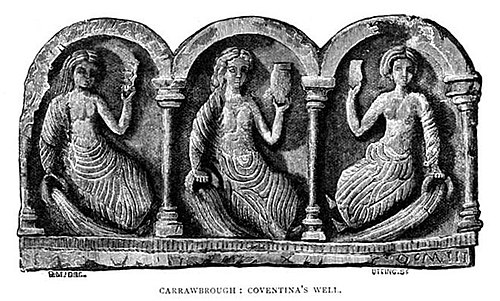Bardnoun
A professional poet and singer, like among the ancient Celts, whose occupation was to compose and sing verses in honor of the heroic achievements of princes and brave men.
Bardnoun
(by extension) A poet.
Bardnoun
A piece of defensive (or, sometimes, ornamental) armor for a horse's neck, breast, and flanks; a barb. (Often in the plural.)
Bardnoun
Defensive armor formerly worn by a man at arms.
Bardnoun
(cooking) A thin slice of fat bacon used to cover any meat or game.
Bardnoun
The exterior covering of the trunk and branches of a tree; the rind.
Bardnoun
Specifically, Peruvian bark.
Bardverb
To cover a horse in defensive armor.
Bardverb
(cooking) To cover (meat or game) with a thin slice of fat bacon.
Bardnoun
A professional poet and singer, as among the ancient Celts, whose occupation was to compose and sing verses in honor of the heroic achievements of princes and brave men.
Bardnoun
Hence: A poet; as, the bard of Avon.
Bardnoun
A piece of defensive (or, sometimes, ornamental) armor for a horse's neck, breast, and flanks; a barb. [Often in the pl.]
Bardnoun
Defensive armor formerly worn by a man at arms.
Bardnoun
A thin slice of fat bacon used to cover any meat or game.
Bardnoun
The exterior covering of the trunk and branches of a tree; the rind.
Bardnoun
Specifically, Peruvian bark.
Bardverb
To cover (meat or game) with a thin slice of fat bacon.
Bardnoun
a lyric poet
Bardnoun
an ornamental caparison for a horse
Bardverb
put a caparison on;
Bardnoun
a poet, traditionally one reciting epics and associated with a particular oral tradition
Bardnoun
Shakespeare.
Bardnoun
the winner of a prize for Welsh verse at an Eisteddfod
Bardnoun
a rasher of fat bacon placed on meat or game before roasting.
Bardverb
cover (meat or game) with rashers of fat bacon
Bard
In Celtic cultures, a bard is a professional story teller, verse-maker, music composer, oral historian and genealogist, employed by a patron (such as a monarch or noble) to commemorate one or more of the patron's ancestors and to praise the patron's own activities. Originally bards were a specific lower class of poet, contrasting with the higher rank known as fili in Ireland and Highland Scotland.
Lardnoun
Fat from the abdomen of a pig, especially as prepared for use in cooking or pharmacy.
Lardnoun
(obsolete) Fatty meat from a pig; bacon, pork.
Lardverb
(cooking) To stuff (meat) with bacon or pork before cooking.
Lardverb
To smear with fat or lard.
Lardverb
To garnish or strew, especially with reference to words or phrases in speech and writing.
Lardverb
To fatten; to enrich.
Lardverb
To grow fat.
Lardverb
To mix or garnish with something, as by way of improvement; to interlard.
Lardnoun
Bacon; the flesh of swine.
Lardnoun
The fat of swine, esp. the internal fat of the abdomen; also, this fat melted and strained.
Lardverb
To stuff with bacon; to dress or enrich with lard; esp., to insert lardons of bacon or pork in the surface of, before roasting; as, to lard poultry.
Lardverb
To fatten; to enrich.
Lardverb
To smear with lard or fat.
Lardverb
To mix or garnish with something, as by way of improvement; to interlard.
Lardverb
To grow fat.
Lardnoun
soft white semisolid fat obtained by rendering the fatty tissue of the hog
Lardverb
prepare or cook with lard;
Lardverb
add details to
Lardnoun
fat from the abdomen of a pig that is rendered and clarified for use in cooking.
Lardnoun
excess fat in a person
Lardverb
insert strips of fat or bacon in (meat) before cooking
Lardverb
smear or cover (a foodstuff) with lard or fat to prevent it drying out during storage
Lardverb
embellish (talk or writing) with an excessive number of esoteric or technical expressions
Lardverb
cover or fill thickly or excessively
Lard
Lard is a semi-solid white fat product obtained by rendering the fatty tissue of a pig. It is distinguished from tallow, a similar product derived from fat of cattle or sheep.












